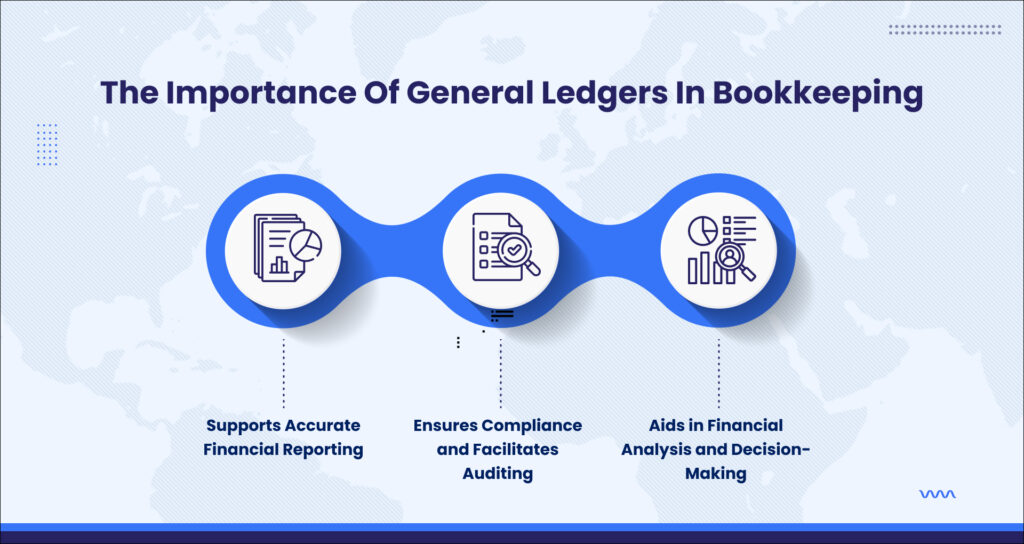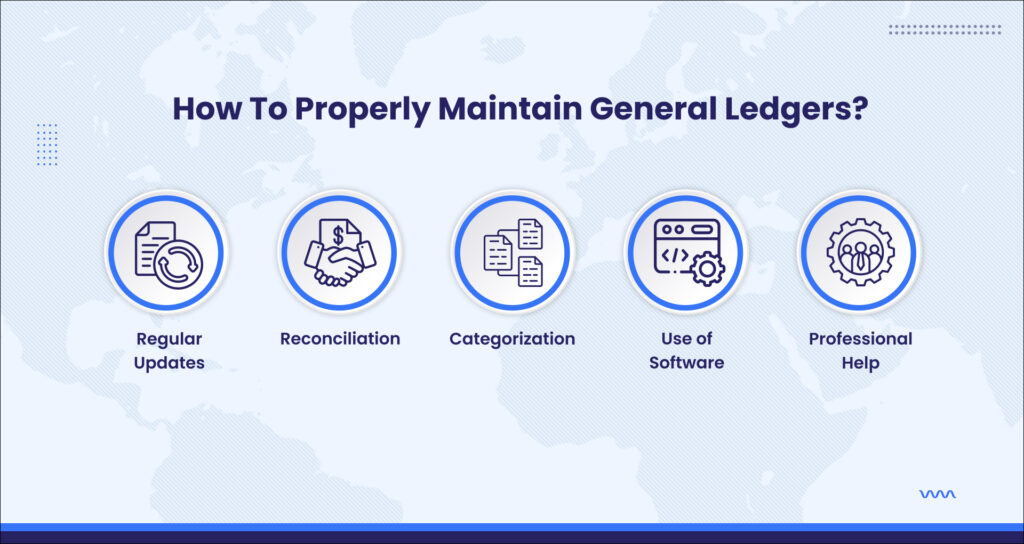Understanding General Ledgers: Their Importance and Function
Bookkeeping ledgers are the backbone of any business’s financial health, and among them, the general ledger stands as the most critical component. If you’ve ever found yourself lost in the complexities of financial management, you’re not alone.
Many business owners struggle with understanding the importance and function of general ledgers, leading to errors that can have costly consequences. The stress of managing your business finances without a clear grasp of how to maintain accurate records is a pain point that can’t be ignored.
This blog will guide you through understanding general ledgers, why they’re so crucial, and how to effectively manage them, ultimately helping you avoid common pitfalls.
What Are General Ledgers?
A general ledger is the complete record of all a business’s financial transactions, categorized into various accounts such as assets, liabilities, equity, revenues, and expenses. It serves as the foundation for preparing financial statements like the balance sheet and income statement.
Unlike other ledgers that might focus on specific transactions or accounts, the general ledger provides a comprehensive view of the financial health of your business.
The general ledger is composed of two main components: the chart of accounts and the transactions. The chart of accounts is a listing of all accounts that a business uses, while transactions are detailed records of all financial activities, such as sales, purchases, and payroll.
For instance, let’s say your business made a sale worth $1,000. This transaction would be recorded in the general ledger under both the sales account (as credit) and the accounts receivable account (as a debit). Each transaction is recorded as a journal entry, which typically includes the date, accounts involved, amounts, and a brief description of the transaction.
The Importance of General Ledgers in Bookkeeping

- Supports Accurate Financial Reporting
- Ensures Compliance and Facilitates Auditing
- Aids in Financial Analysis and Decision-Making
The general ledger is more than just a collection of numbers; it’s the key to unlocking the true financial picture of your business. Here’s why it’s so vital:
Supports Accurate Financial Reporting
They are the primary source for preparing financial statements, which are crucial for both internal decision-making and external reporting. Without an accurate general ledger, your financial statements would be unreliable, leading to poor business decisions.
Ensures Compliance and Facilitates Auditing
Accurate bookkeeping ledgers, especially general ledgers, are essential for maintaining compliance with tax laws and regulations. If your business undergoes an audit, it will be the first document an auditor will review. Any discrepancies or inaccuracies can lead to penalties and legal issues.
Aids in Financial Analysis and Decision-Making
By providing a complete view of your business’s financial transactions, it helps analyze trends, manage cash flow, and make informed decisions. Whether you’re considering an expansion, cutting costs, or investing in new opportunities, the insights derived from the general ledger are invaluable.
According to a recent survey by the Institute of Management Accountants (IMA), 72% of small businesses that adopted comprehensive bookkeeping practices, including well-maintained general ledgers, saw a significant improvement in their financial health within a year. This statistic underscores the importance of accurate bookkeeping in driving business success.
Challenges in Managing General Ledgers
Managing general ledgers is not without its challenges, especially for small business owners who may not have a background in accounting. Here are some common pain points:
- Maintaining a general ledger requires attention to detail and a deep understanding of accounting principles. For many small business owners, the process can be overwhelming and time-consuming, taking them away from focusing on their core business activities.
- Errors in bookkeeping ledgers can lead to inaccurate financial statements, poor decision-making, and even legal issues. Common errors include incorrect categorization of transactions, missed entries, and miscalculations.
- Many business owners lack a clear understanding of how general ledgers work and their importance in overall financial management. This lack of knowledge can lead to neglect, resulting in outdated or incomplete ledgers.
- Poorly managed ledgers can lead to hidden costs, such as penalties for non-compliance, increased audit fees, and the potential loss of business opportunities due to unreliable financial data. The cost of fixing these issues later on can be much higher than maintaining accurate records from the start.
Understanding the General Ledger and Double-Entry Accounting
Double-entry accounting is the most common system used by small businesses. It helps manage daily transactions and catch potential errors by recording each transaction twice—once as a credit (money leaving an account) and again as a debit (money entering an account).
The phrase “balance the books” comes from this method. To ensure financial stability, your total debits should always equal your total credits.
When setting up your general ledger, you’ll need to choose between the double-entry and single-entry methods. The single-entry system is less common and better suited for smaller, simpler businesses with fewer monthly transactions.
For a straightforward introduction, check out our guide to double-entry accounting.
The Role of Trial Balances in Double-Entry Accounting
If you explore double-entry accounting, you’ll frequently encounter the term “trial balance.” This is a key financial tool in this system. When you use a double-entry ledger, be prepared to prepare trial balances regularly.
A trial balance ensures your records are accurate before you generate financial statements for a specific period. It adds up all debits and credits for that period to confirm they match.
If there’s a discrepancy and the books don’t balance, you’ll need to go back, make corrections, and create an adjusted trial balance. This corrected balance is then used to prepare your financial statements.
Although the trial balance is a separate document from your general ledger, it isn’t a stand-alone financial report. Think of the general ledger as the source that provides the necessary information to create your financial statements.
How to Properly Maintain General Ledgers

- Regular Updates
- Reconciliation
- Categorization
- Use of Software
- Professional Help
Maintaining a general ledger might seem daunting, but with the right approach, it can be manageable and even straightforward. Here’s how you can do it:
1. Regular Updates
Ensure that all financial transactions are recorded in the general ledger regularly. This could be daily, weekly, or monthly, depending on the volume of transactions in your business. Regular updates prevent transactions from being missed or forgotten.
2. Reconciliation
Reconcile your general ledger with your bank statements, credit card statements, and other financial records regularly. This helps identify and correct discrepancies early, ensuring the accuracy of your financial statements.
3. Categorization
Properly categorize all transactions into the appropriate accounts. For example, sales should be recorded under revenue, while office supplies should be under expenses. Misclassification can lead to inaccurate financial reports.
4. Use of Software
Consider using bookkeeping software that automates many of the tasks associated with maintaining a general ledger. Software can reduce the risk of errors, save time, and provide real-time financial insights.
5. Professional Help
For complex transactions or if you’re unsure about how to categorize certain entries, don’t hesitate to seek professional help. An accountant can ensure that your general ledger is accurate and compliant with all regulations.
The Role of Bookkeeping Software
Bookkeeping software has transformed the way businesses handle their finances, offering a range of benefits to ensure accurate general ledgers. One of the primary advantages is the automation of tasks. With software, you can automate transaction recording, categorization, and reconciliation, significantly reducing the time spent on these tasks and minimizing the risk of errors.
Another benefit is the real-time financial insights. You can easily monitor your revenue, expenses, and cash flow, giving you a clear picture of your financial health and enabling you to make informed decisions.
Ease of use is also a key feature. Designed with user-friendliness in mind, these tools are accessible even to those without an accounting background. This makes it easier for small business owners to manage their finances without the need for extensive training.
Additionally, many solutions offer integration with other business tools, such as payroll systems, invoicing software, and inventory management systems. This integration streamlines financial management and ensures that all your records remain consistent across various platforms.
Why Do You Need Professional Help?
While bookkeeping software can simplify the process, there are still many situations where professional help is invaluable:
- If your business deals with complex transactions, such as international sales, investments, or mergers, a professional accountant can ensure that these are recorded correctly in your general ledger.
- Tax laws and regulations can be complex and are subject to change. An expert can help ensure that your general ledger is compliant with all relevant laws, reducing the risk of penalties and audits.
- A professional can provide insights into your financial health and help you plan for the future. They can analyze your general ledger to identify trends, opportunities, and areas where you can cut costs.
- Skillful resources are experienced in identifying and correcting common bookkeeping errors before they become bigger problems. They can also provide training and guidance to help you avoid these pitfalls in the future.
In short, consider a business that was facing financial difficulties due to inaccurate bookkeeping. After hiring a professional accountant, they were able to clean up their general ledger, identify areas of overspending, and implement a more effective budgeting process. This led to a turnaround in their financial situation, allowing the business to thrive once again.
Wrap Up!
The general ledger is the cornerstone of your business’s financial management. It’s not just about recording transactions; it’s about understanding your business’s financial health and making informed decisions that drive success.
The pain points associated with managing general ledgers, such as complexity, risk of errors, and lack of understanding, can be daunting. However, with the right approach, including regular updates, reconciliation, proper categorization, and the use of bookkeeping software, you can maintain an accurate general ledger.
But even with the best practices in place, there are times when professional help is necessary. Whether it’s dealing with complex transactions, ensuring compliance, or simply getting a clearer picture of your financial situation, a professional accountant can add significant value to your business.
Create Your Personalized General Ledger with The Pro Accountants
At The Pro Accountants, we specialize in helping businesses like yours maintain accurate general ledgers and stay on top of their financial management. Our team of experienced accountants is here to take the stress out of bookkeeping so that you can focus on growing your business. We offer a range of services tailored to your needs, from regular bookkeeping to financial planning and analysis.
Don’t let the challenges of managing general ledgers hold your business back. Contact us today to schedule a consultation and learn how we can help you achieve financial success.
